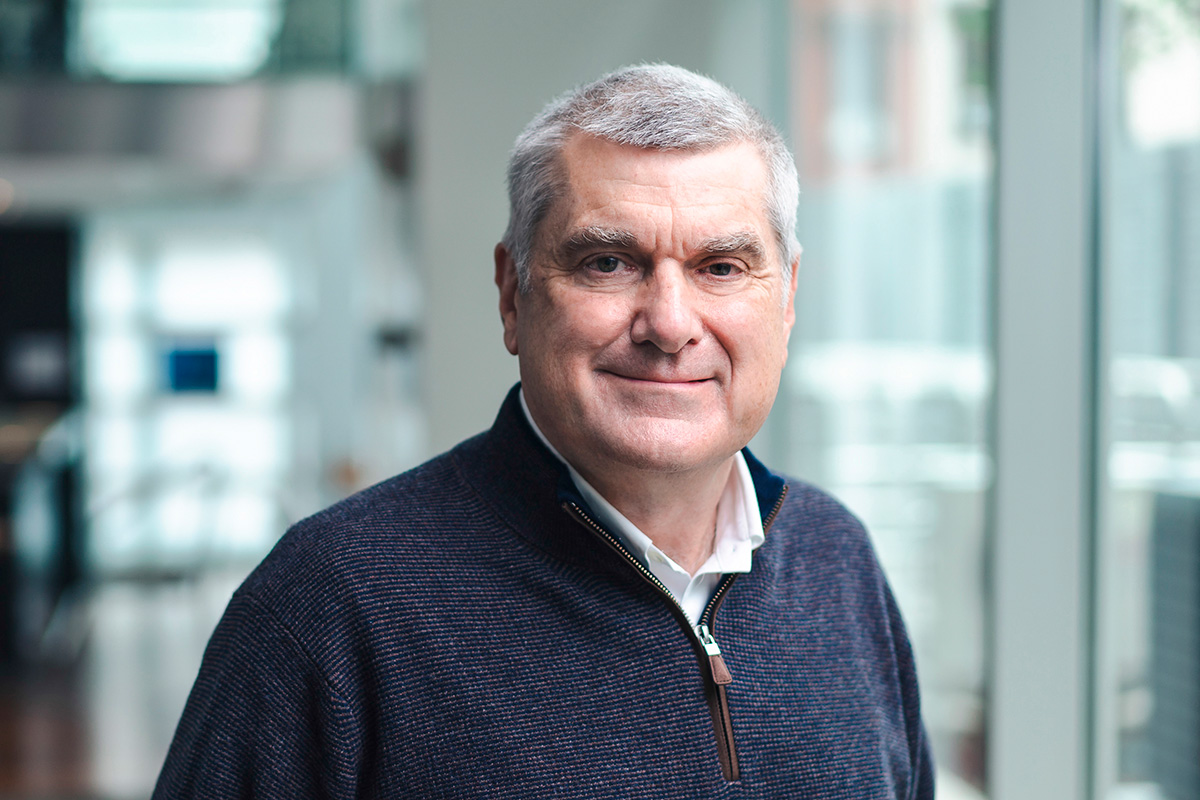From the President

Craig B. Thompson, President and Chief Executive Officer, Douglas A. Warner III Chair
For 138 years, Memorial Sloan Kettering Cancer Center (MSK) has fulfilled its promise to people facing cancer.
The most recent evidence made international headlines in June 2022 at one of the country’s premier cancer conferences. Physicians and journalists hailed two groundbreaking studies by MSK researchers, presented at the American Society of Clinical Oncology (ASCO).
In one historic trial led by medical oncologists Andrea Cercek and Luis Diaz, all 14 patients with rectal cancer saw it disappear completely, thanks to a form of immunotherapy that helps people whose tumors contain a specific genetic mutation. In this trial involving a subset of rectal cancer patients, the immune system was unleashed to attack the tumors, and no surgery, chemotherapy, or radiation was needed, sparing patients from debilitating side effects. It was a rare — if not first — study in which every person with cancer who was enrolled experienced 100% remission.
In the second trial, MSK medical oncologist Shanu Modi presented research that will change the practice of treatment for patients with metastatic breast cancer that is known as HER2-low, meaning a low level of a protein that fuels the growth of cancer cells. Using the targeted therapy trastuzumab deruxtecan, the trial found that the drug held cancer in check nearly twice as long as standard chemotherapy. These are stunning results for patients with advanced breast cancer.
Both trial presentations received standing ovations at the conference. They are just the beginning. Our researchers will continue investigating whether these treatment approaches can help even more patients with other forms of cancer.
We are building momentum for the decade ahead — and beyond — to help people with cancer in every way we can.
Foundation for the Future
MSK welcomed new leaders in key roles in 2021. Deb Schrag was named Chair of the Department of Medicine. This is a homecoming for Dr. Schrag, who began her career as a medical oncologist at MSK and is recognized as a pioneer for her work in improving the delivery, quality, and effectiveness of cancer care.
MSK’s unparalleled nursing staff also received a new leader with the appointment of Tracy Gosselin as Senior Vice President and Chief Nursing Executive. She leads nearly 5,000 highly skilled nurses and support staff across 25 sites.
MSK also named Rémy Evard as Chief Digital Officer and Head of Technology. Among many achievements in 2021, MSK’s technology and digital team, DigITs, consolidated telemedicine systems onto a single platform, helping telemedicine visits expand from 300 per week in 2020 to more than 5,800 per week at the end of 2021.
Clinical and Research Advances
MSK’s legacy of excellence in research continued in 2021, with 49 faculty members ranked among the most Highly Cited Researchers in the world by the research firm Clarivate.
This Annual Report includes just some of the highlights:
The lab of Andrea Schietinger, Associate Member of the Immunology Program at the Sloan Kettering Institute (SKI), found that autoimmunity can be caused by a never-before-seen population of stem-like T cells. This research could provide important insights into making T cells more effective cancer killers.
Scott Lowe, Chair of the Cancer Biology and Genetics Program, and his lab at SKI also discovered how genetic changes and environment — specifically, tissue damage — work together in the earliest stages of pancreatic cancer development, allowing the disease to grow. This discovery lays the groundwork for earlier diagnosis and better treatment of this particularly difficult cancer.
Similarly, clinical advances made at MSK in 2021 offer new hope to people facing some of the most difficult and complex cancers. Among many examples, medical oncologist Bob Li co-led trials that resulted in FDA approval of the first-ever KRAS inhibitor, targeting an oncogene that fuels cancer growth that had been considered “undruggable” for decades. This treatment, called sotorasib, provides a new option for some patients with non-small cell lung cancer.
MSK medical oncologist Michael Morris has been a leading researcher of a therapy for advanced prostate cancer that can kill cancer cells that are resistant to other treatments. Based on clinical trials he led, the FDA approved a treatment called 177Lu-PSMA-617, which uses a molecule that seeks out and attaches to a specific protein on the cancer cell. The technology then delivers radiation that destroys the cancer cell. This important advance offers new hope for people with prostate cancer, which kills 34,000 people in the U.S. each year.
Diversity and Inclusion
At MSK, our continued efforts to build a more equitable culture are bearing fruit. In 2021, Forbes named MSK one of America’s Best Employers for Diversity, ranking 17th out of 500 organizations and the second-highest-ranked hospital.
During 2021, MSK continued building an exceptional team at SKI and Memorial Hospital that better represents the diverse world we live in, which includes hiring nine new faculty members from underrepresented communities. The Nicholls-Biondi Diversity Clinical Scientist Fellowships for Academic Careers in Cancer Research were also created in 2021, thanks to the support of Jamie C. Nicholls, MSK Board of Trustees, and her husband, O. Francis Biondi.
We also established the MSK Bridge program, which brings 10 college graduates from backgrounds that are underrepresented in science and medicine to MSK labs for two years.
In addition, MSK continued working in 2021 to increase the racial and ethnic diversity of our patient population by making care more accessible.
These efforts include expanded community outreach programs to improve cancer health equity. Among them is the Endometrial Equity Cancer Program, led by Carol Brown, gynecologic surgeon and Chief Health Equity Officer, with colleagues including nurse practitioner Latasha Anderson-Dunkley. The program conducts educational outreach and screens women at high risk to reduce the disparity that makes Black women almost twice as likely to die of endometrial cancer as white women.
MSK also redoubled its efforts in 2021 to fight COVID-19. To ensure vaccines were accessible to as many of our patients as possible, we set up pop-up clinics, including at the MSK Ralph Lauren Center, located in Harlem, and the MSK Brooklyn Infusion Center. To reach populations outside MSK that have been disproportionately affected by the pandemic, MSK created partnerships. At MSK Nassau, more than 400 residents from nearby towns were vaccinated.
In New York City, MSK partnered with city government and the Abyssinian Baptist Church to establish a vaccine clinic at the historic church in Harlem. Approximately 350 MSK staff volunteered to help, administering 12,000 doses of vaccine to community members.
Recognition and Honors
MSK’s excellence has remained constant throughout the pandemic. In 2021, U.S. News & World Report again ranked MSK as one of the top 2 cancer hospitals in the country, as it has every year since the ratings began more than three decades ago. Among all hospitals — not just cancer hospitals — MSK was ranked No. 1 in the nation for the treatment of ear, nose, and throat diseases; No. 2 in gynecology; and No. 3 in urology.
Many individual members of the MSK community also received prestigious recognitions. Dr. Diaz, Head of the Division of Solid Tumor Oncology, was appointed to the National Cancer Advisory Board; Dana Pe’er, Chair of the Computational and Systems Biology Program, SKI, was named a Howard Hughes Medical Institute Investigator; Justin Perry, cell biologist and immunologist at SKI, was named a recipient of the National Institutes of Health Director’s New Innovator Award; Larry Norton, Medical Director at the Evelyn H. Lauder Breast Center, was elected to the American Academy of Arts and Sciences; Esther Babady, Chief of the Clinical Microbiology Service, was named to the Crain’s New York Business 2021 Empire Whole Health Heroes List; Dr. Brown was named one of Crain’s New York Business’ Notable Black Leaders and Executives; Richard O’Reilly, former Chair of the Department of Pediatrics, was inducted into the 2021 Giants of Cancer Care®; and Direna Alonso-Curbelo, postdoctoral fellow at SKI, was named a winner of the 2021 Blavatnik Regional Awards for Young Scientists, among many other recognitions of MSK faculty, staff, and trainees.
Continued Support
Looking ahead, MSK is deeply grateful for support that will save lives for decades to come. 2021 was a record-breaking year for donor support of MSK, more than doubling the previous record set in 2018.
Over 800,000 donors support MSK, including individuals who participate in Kids Walk for MSK Kids, Fred’s Team, and Cycle for Survival®, as well as visionary gifts from generous benefactors.
Among many highlights are the Tow Center for Development Oncology, made possible by support from the Tow Foundation and other donors; the Lisa and Scott Stuart Center for Adolescent and Young Adult Cancers, supported by Scott Stuart and his wife, Lisa; The Louis V. Gerstner, Jr. Physician Scholars Program, made possible by Lou Gerstner; the Fiona and Stanley Druckenmiller Presidential Innovation Fund, supported by the Fiona and Stanley Druckenmiller Foundation; and The Marie-Josée Kravis and Henry R. Kravis Cancer Ecosystems Project, funded by Marie-Josée Kravis and Henry R. Kravis.
As always, our three pillars — patient care, scientific research, and education — set us apart and set standards in the field. With your continued support, we will carry on our mission of bold discovery and life-changing care.
CRAIG B. THOMPSON
President and Chief Executive Officer
Douglas A. Warner III Chair
From the Chairman

Scott M. Stuart, Chair, Board of Trustees
As we went to press with this Annual Report for 2021, we welcomed Selwyn M. Vickers, MD, FACS, as our next President and Chief Executive Officer. Dr. Vickers joins MSK in September 2022. An extraordinary surgeon-scientist with a proven track record in leading complex medical centers, Dr. Vickers has built innovative academic and research programs, strengthened clinical care, and has been dedicated to addressing health disparities.
Dr. Vickers joins MSK from the University of Alabama at Birmingham (UAB), where he led one of the largest public academic medical centers in the country and was CEO of the UAB Health Systems and UAB/Ascension St. Vincent’s Alliance.
On behalf of the MSK Board of Trustees, I would like to offer our enormous gratitude to Craig Thompson for his incomparable leadership over the past 12 years. He has overseen one of the most remarkable periods for cancer science and care in history, with standouts including the fields of cancer genomics and immunotherapy.
He has also helped lead the growth of MSK’s pioneering Regional Care Network, transforming cancer care to an outpatient basis that allows people to stay closer to home.
At the same time, Dr. Thompson helped steer MSK through some of the greatest challenges in its long history, including Hurricanes Irene and Sandy, which devastated the New York metropolitan area, and of course COVID-19, the greatest public health threat of our lifetime.
I know I speak for all of us when I say it’s a great comfort to know we can rely on Dr. Thompson’s insights for years to come as he returns to his first love, as a renowned cell biologist and faculty member, leading research in his lab at MSK. His imprint on MSK and his contribution to biomedical science are enduring.
He and Dr. Vickers will work together to ensure a smooth transition. In Dr. Vickers, MSK has found a charismatic and compassionate leader who is uniquely qualified to shepherd this great organization into the future.
SCOTT M. STUART
Chair, Board of Trustees
